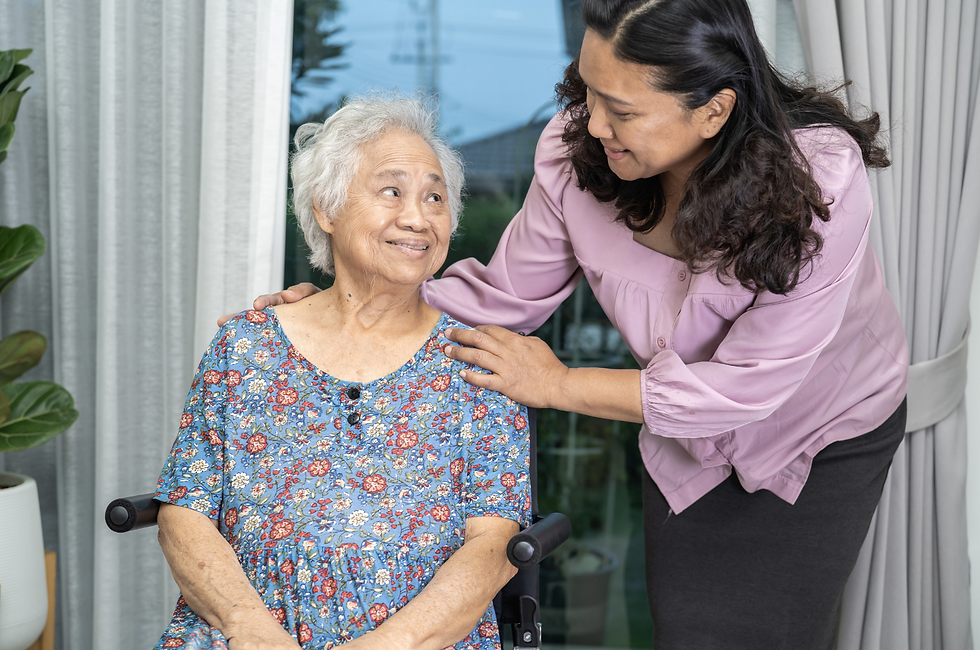Common Fears Caregivers Have for Their Loved Ones
- Senior Support Services

- Mar 8, 2024
- 3 min read

Introduction
As our loved ones age, we often find ourselves grappling with the fears and concerns that come with watching them grow old. Ageing brings about both physical and emotional changes that can leave caregivers feeling overwhelmed and anxious. In this blog post, we'll explore some of the most common fears caregivers have for their ageing loved ones and discuss strategies for managing them.
Health Decline
One of the most significant fears caregivers face is witnessing the decline in their loved one's physical and mental health. Chronic illnesses, cognitive impairment, and mobility issues are just a few of the challenges that come with ageing. The thought of seeing a once vibrant individual plagued with various medical concerns can be daunting. However, it's important to remember that proper medical care, regular check-ups, and a supportive environment can significantly improve the quality of life for ageing individuals. Encouraging healthy habits and maintaining open communication with healthcare professionals can help alleviate some of these fears.
Independence Loss
The loss of independence is another common fear among caregivers. As individuals grow older, they’ll often need assistance with daily tasks and decision-making, which can be difficult for both the caregiver and the loved one. Tasks such as dressing, bathing, cooking, and managing finances may require assistance, leading to a loss of autonomy that can be difficult to accept. For caregivers, witnessing this decline in independence may cause burnout as they strive to provide the necessary support while also balancing their own needs and responsibilities. Implementing strategies such as using assistive devices, arranging for Senior Support Care services, and involving your loved one in decision-making processes whenever possible are all ways to address the challenges of caregiving and mitigate the risk of burnout.
Financial Strain
The financial implications of caring for ageing loved ones can be a significant source of stress for caregivers. Healthcare expenses, long-term care costs, and the impact on retirement savings are all factors that must be considered when caring for an older individual. Planning ahead and exploring available resources, such as government assistance programs and long-term care insurance can help alleviate some of the financial burden. Additionally, having open and honest conversations about financial matters with other loved ones and family members can facilitate better planning and decision-making.
Isolation and Loneliness
Social isolation and loneliness are prevalent issues among ageing individuals, particularly those who live alone or have limited social support. Caregivers fear for their loved one's emotional well-being and worry about their social connectedness. Encouraging participation in social activities, connecting with community resources, and fostering meaningful relationships can help combat feelings of isolation. Additionally, technology can be a valuable tool for staying connected with loved ones, especially in today's digital age.
End-of-Life-Planning
Perhaps one of the most challenging fears for caregivers and their loved ones is facing end-of-life planning. For caregivers, advance directives can have a significant impact on their considerations for end-of-life care for their loved ones. Advance directives can present caregivers with difficult decisions and moral dilemmas, particularly if the directives conflict with their own beliefs or desires for their loved one. Caregivers may struggle with feelings of guilt or responsibility when faced with choices regarding end-of-life care, especially if they feel torn between honoring their loved one's wishes and wanting to prolong life as much as possible. However, having these conversations early on can provide peace of mind and ensure that the individual's wishes are respected. It's essential to approach these discussions with compassion, sensitivity, and a willingness to listen. Seeking support from healthcare professionals, religious or spiritual leaders, and support groups can also help navigate this difficult process.
Conclusion
While the fears associated with caring for ageing loved ones are undoubtedly valid, it's essential to remember that support and resources are available. Addressing concerns about health decline, independence loss, financial strain, isolation, and end-of-life planning head-on can help caregivers better navigate the challenges of ageing with compassion and resilience. Open communication, proactive planning, and a commitment to promoting dignity and autonomy can help alleviate fears and ensure the well-being of both caregivers and their loved ones.
References:








Comments